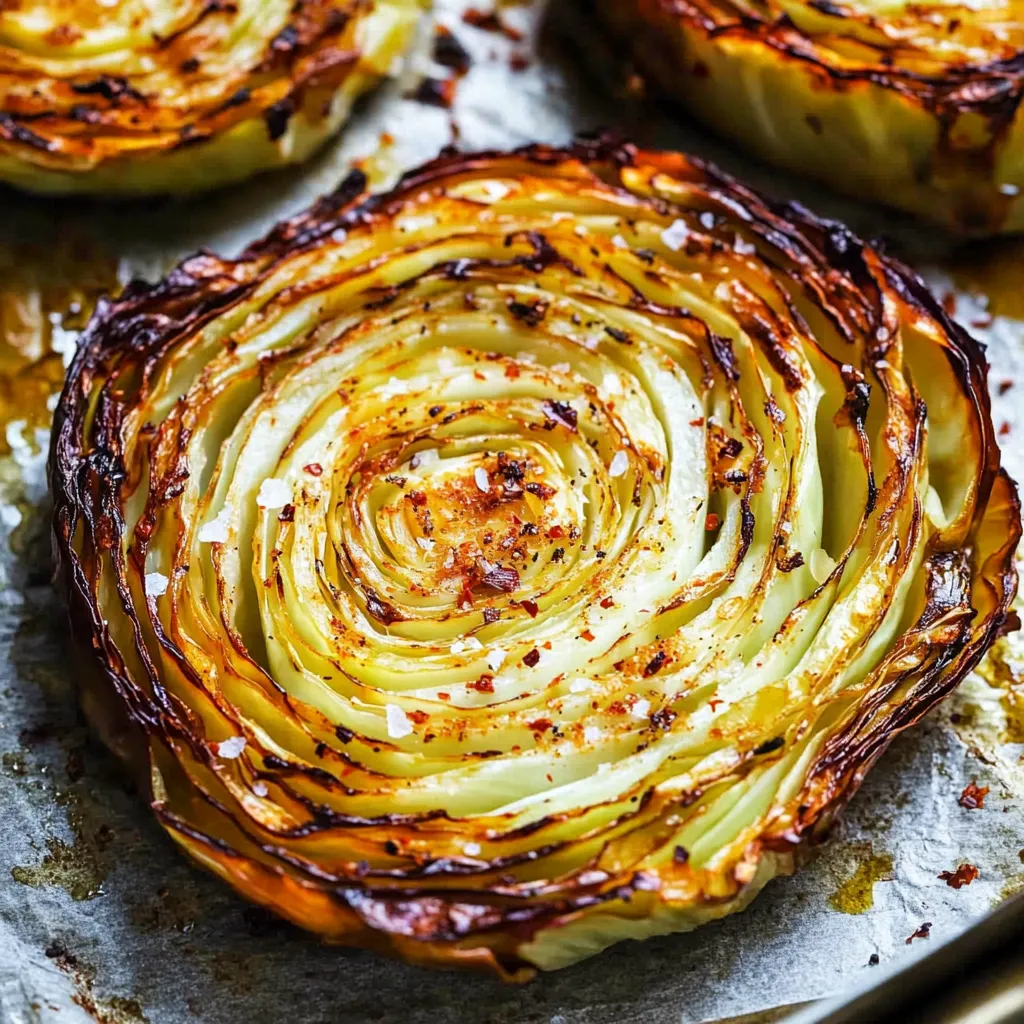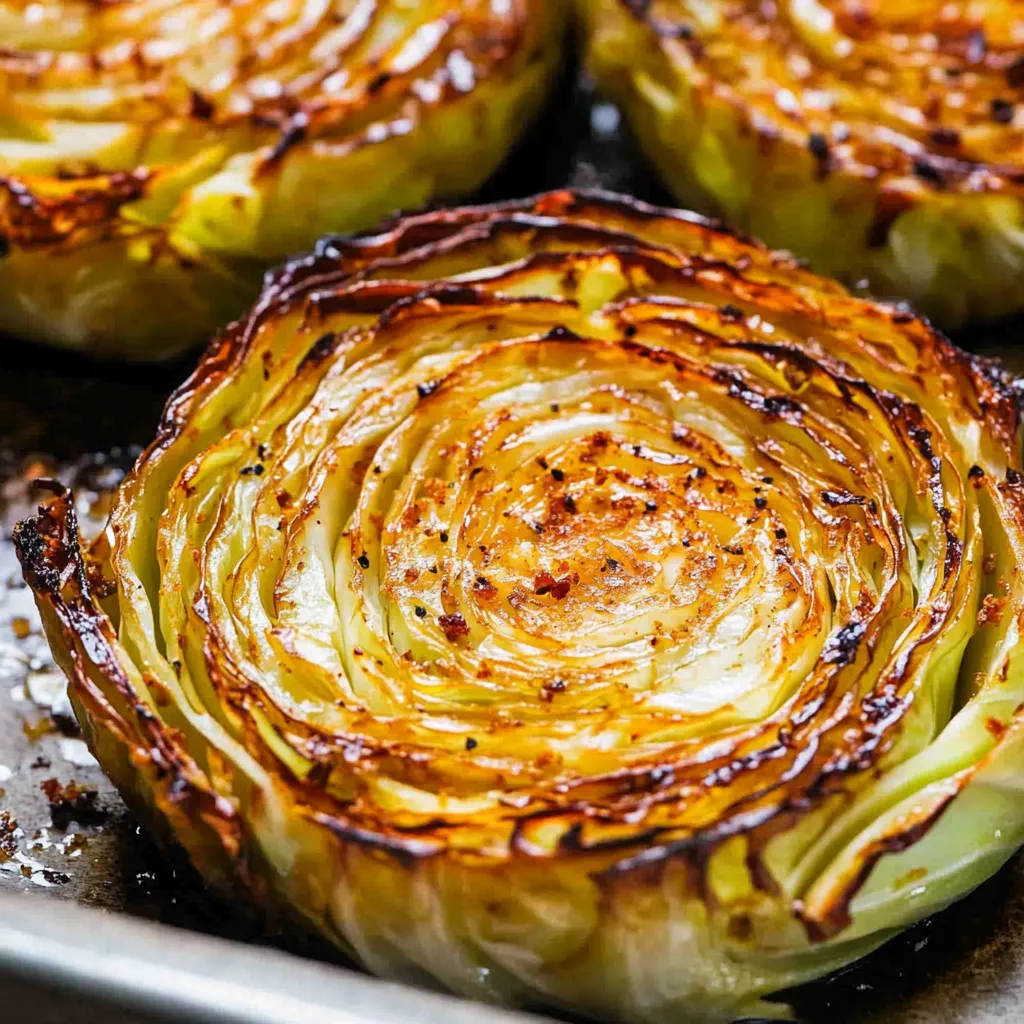 Pin it
Pin it
Tender on the inside, caramelized and crispy on the edges, these roasted cabbage steaks transform an often overlooked vegetable into a showstopping dish. With minimal ingredients and effort, you'll create something surprisingly flavorful that might just convert even the most stubborn cabbage skeptics.
I first made these cabbage steaks during a tight-budget week when my vegetable drawer contained nothing but a lonely head of cabbage. What started as a necessity quickly became a favorite request in our home. My husband, who previously claimed to "hate cabbage in all forms," now specifically asks for these roasted slices at least once a week.
Ingredients
- Cabbage – A fresh, heavy, tight head of green cabbage provides the perfect foundation. Its natural sweetness intensifies beautifully when roasted, creating complex flavors from this humble vegetable.
- Olive oil – Beyond preventing sticking, olive oil helps the cabbage caramelize and crisp at the edges while keeping the interior tender. Its subtle fruity notes complement the cabbage's sweetness.
- Garlic powder – Adds wonderful aromatic flavor without the risk of burning that comes with fresh garlic. It distributes evenly across the cabbage's surface for consistent flavor in every bite.
- Paprika – Brings subtle warmth, a hint of sweetness, and beautiful color to the finished dish. The slight earthiness pairs perfectly with the caramelized cabbage.
- Salt – Critical for enhancing the cabbage's natural flavor and drawing out moisture that helps with caramelization. Don't be shy here – cabbage benefits from proper seasoning.
- Red pepper flakes – Optional but highly recommended for adding a gentle heat that balances the cabbage's sweetness. The spice cuts through the richness of the olive oil beautifully.
Step-by-Step Instructions
- Prepare your cabbage –
- Start with a firm, fresh head of green cabbage. Remove any wilted outer leaves and rinse the head thoroughly. Pat completely dry to ensure proper caramelization in the oven.
- Create stable slices –
- With a sharp knife, cut off the stem end to create a flat surface, then stand the cabbage upright on this newly created base. Cut the whole head in half down through the core, then cut each half into two even slices, maintaining that 3/4 to 1-inch thickness. The core helps hold each "steak" together during cooking.
- Arrange for optimal cooking –
- Line a baking sheet with parchment paper (this prevents sticking and makes cleanup easier). Place each cabbage slice on the sheet with enough space between them to allow hot air circulation. Crowding the pan will cause steaming rather than roasting.
- Apply oil thoroughly –
- Using a pastry brush, generously coat the top surface of each cabbage steak with olive oil, making sure to get into all the nooks and crannies between leaves. This even coating ensures uniform browning and prevents dry spots.
- Season the first side –
- Sprinkle salt, garlic powder, and paprika evenly across each slice, making sure to season all the way to the edges. The seasoning should be visible but not excessive.
- Flip and repeat –
- Carefully turn each cabbage slice over, maintaining its structure, and repeat the oil and seasoning process on the second side. This ensures flavor throughout the entire steak, not just on top.
- Add heat if desired –
- Sprinkle a small amount of red pepper flakes across each slice if you enjoy a touch of spice. Even a small amount adds wonderful dimension to the final dish.
- Roast at high heat –
- Place the baking sheet in a preheated 400°F oven. The high temperature is crucial for developing those caramelized edges while keeping the centers tender rather than mushy.
- Watch for doneness cues –
- After about 25 minutes, look for deeply golden edges, some charring on the thinner outer leaves, and a knife that slides easily into the center of each steak. The cabbage should be tender but still hold its shape when moved.
- Serve immediately –
- These cabbage steaks are at their absolute best when fresh from the oven, while the edges are still crispy and the centers are steaming hot.
 Pin it
Pin it
The transformation that happens in the oven is truly magical – what goes in as pale, humble cabbage emerges deeply caramelized, with a complexity of flavor that belies the simple ingredients. The natural sugars in the cabbage concentrate and caramelize, creating sweet, nutty notes that balance perfectly with the savory seasonings.
My grandmother always said cabbage reveals its true character when given proper heat and time. She'd roast whole heads wrapped in foil for Sunday dinners, but this modern "steak" approach creates even more of those delicious caramelized edges that everyone fights over. The first time I watched my vegetable-averse nephew devour an entire cabbage steak without prompting, I knew this simple preparation had special powers.
The Science of Caramelization
What makes these cabbage steaks so irresistible is the perfect caramelization that occurs during roasting. At temperatures above 320°F, the natural sugars in the cabbage begin to break down and form hundreds of new flavor compounds, creating depth and complexity that transforms the vegetable completely. The crispy edges contain concentrated flavor thanks to the Maillard reaction – the same process that makes a perfectly seared steak so delicious.
Perfect Pairings
While these cabbage steaks are satisfying enough to be the star of a plant-based meal, they're incredibly versatile as a side dish. Their subtle sweetness and savory notes complement everything from hearty pasta dishes to simple grilled proteins. The substantial texture makes them particularly satisfying alongside lighter main courses that might otherwise leave you wanting more.
Seasonal Adaptations
While green cabbage is available year-round, this same technique works beautifully with seasonal variations. Try it with red cabbage in the fall for a more robust flavor and stunning visual presentation, or with napa cabbage in the spring for a more delicate result. Each variety brings its own character to the basic technique.
After years of experimenting with different vegetables, I've found few transformations as dramatic as what happens to cabbage in a hot oven. The way the edges curl and crisp while the layers separate slightly, creating varying textures throughout each slice, makes this humble vegetable feel special and crave-worthy. There's something deeply satisfying about creating such profound flavor from so few ingredients – a reminder that good cooking often requires not complexity, but simply understanding how to coax the best from each ingredient.
Frequently Asked Questions
- → How do I know when cabbage steaks are done?
- They're done when the edges are crispy and browned, and the center is tender when pierced with a fork, about 25 minutes at 400°F.
- → Can I use red cabbage instead of green?
- Yes! Red cabbage works great too, though it may need an extra few minutes of cooking time as it's typically denser.
- → What other seasonings can I use?
- Try Italian herbs, curry powder, taco seasoning, or simply salt and pepper. Cabbage pairs well with many flavors.
- → How do I store leftover cabbage steaks?
- Cool completely, then store in an airtight container in the fridge for up to 3 days. Reheat in a 350°F oven until warm.
- → Can I make these in an air fryer?
- Yes! Cook at 380°F for about 10-12 minutes, flipping halfway through for even browning.
